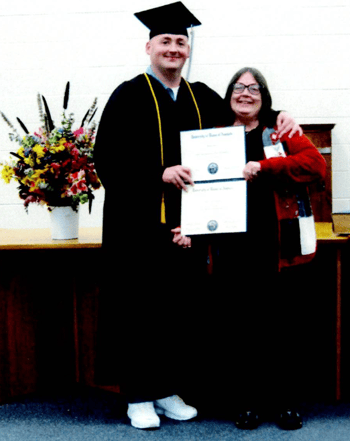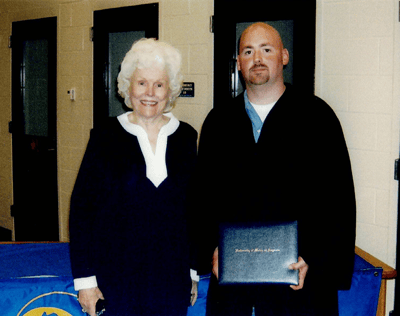Center for Justice & Economic Advancement
Normalizing Education Resource Center
Education and Work Inspire Change for People Who Are Incarcerated

By Shaun Libby
Investing in prison education and work opportunities inspires hope, prepares residents for reentry, and reduces recidivism while also fostering positive improvements in prison culture.
Higher education in prison changed my life, period. That’s not hyperbole; it’s simply a fact.

I had been incarcerated for over seven years when I started the journey of higher education in prison—that was 18 years ago. Over these years, I have seen the college program at the Maine State Prison grow from its first cohort of about nine students to dozens of students in the undergraduate program. Another six to eight people are enrolled in graduate or PhD programs, and there are a dozen or so students in a religious-based degree-granting higher education program. With the expansion of the Pell Grant program to once again cover students who are incarcerated, the hope is that these numbers will continue to grow.
Over the years, I’ve witnessed the transformational power of higher education in prison on my life, on the lives of many of the other men who also have participated in the program, and on the facility as a whole. And one way in particular that higher education is transforming the Maine State Prison and the operations of the Maine Department of Corrections (MDOC) as a whole is by expanding access to quality jobs for both people who are completing their sentences and those who are still incarcerated.
And as more students serving prison sentences take advantage of renewed access to Pell Grants, more and more people, prisons, and communities will experience this transformational power.
An Opportunity for Change
After being arrested at age 18 and sentenced to 40 years in prison, I felt like my life was over. I entered prison like a lot of people—dealing with too many thoughts and feelings to wrap my head around. I felt hopeless, like I had nothing to live for. I spent the first seven years of my sentence continuing to feel hopeless while simply trying to live as comfortably as I could and not thinking at all about my future. I began to feel stagnant and one-dimensional because I wasn’t really using my brain.
I decided that I needed a change and looked into taking college courses. There was a program at the time that allowed residents to take one college class per semester, with part of the cost covered by the Resident Benefit Fund. There were no onsite classes; instruction was provided through pre-recorded videos. I didn’t realize it then, but an in-person college program was in development and getting ready to be rolled out in my facility. Roughly six weeks later, I took my placement tests and was accepted into the first cohort of students in the new program offered by the University of Maine at Augusta and sponsored by the amazing Doris Buffet and her Sunshine Lady Foundation.

Being accepted into that program finally gave me something to be proud of, and it gave me a feeling of hope for the first time in years. But that feeling didn’t last long. My first two college classes were biology and ethics, and I scored a 38 (out of 100) on the first biology test.
To be clear, it was the first college exam I had ever taken, but I was still disappointed by my performance. The feelings of hopelessness and shame returned, and my self-esteem plummeted. I felt like college wasn’t right for me and decided to talk to the onsite program liaison about dropping out. That one conversation changed a lot for me. She talked me out of dropping out and enlisted my professors and some of my classmates to help me get back on track. Having this community of people band together to help me—and each other—enabled me to work my way to a passing grade in biology that semester and continue my journey as a college student.
That community only grew stronger over the following semesters and years. Suddenly, I was part of a group of people working toward a common goal, and we took pride in what we were doing—building a program and a community of interconnected people that included professors, college administrators, prison education staff, prison administrators, and residents. I felt empowered for the first time in years. My confidence and self-esteem were higher than they had been since before I was arrested. I felt privileged to be a part of this small community that was working together in ways that were uncommon in this environment. I’ve had the pleasure of witnessing similar transformations in many of my peers as this program has grown over the years.
"I will never tire of watching men who experience feelings of guilt because they can’t play bigger roles in their children’s lives . . . see the inspired look in their children’s eyes when they graduate or present their work at a symposium."
Becoming Changemakers in the Community
That sense of community manifests itself in many ways. It helps build up students’ self-esteem and confidence. It allows them to see the change within themselves and believe they can be changemakers in the wider community and in the lives of others.
Current students and alumni are facilitating various types of programs for other residents and acting as ambassadors for the college program. Many are also working as peer mentors, certified recovery coaches, and restorative justice practitioners or as partners to community-based organizations in Maine.
A man named Charlie Jones was so affected by a book he read in a class—The Code of the Warrior by Shannon French (a book that he likely wouldn’t have read otherwise)—that he now facilitates workshops about the book’s themes of honor, integrity, ethics, and moral codes for other residents.
Leaders in the MDOC have said that they tend to see better results from peer-facilitated programs like that than in programs led by staff or volunteers.
Postsecondary programs also help people who are incarcerated strengthen bonds with family and friends, who often come together to celebrate students’ graduations and other achievements.
Being able to share these experiences with my family certainly means a lot to me. I’ve had opportunities to thank my mother and brothers for their ongoing love and support as I received my diploma or presented a piece of scholarly work at a symposium. I talk to my mother every week, and just about every conversation we have starts with her asking, “How’s school?” It may seem like a simple question, but that semblance of normalcy means more than I can put into words.
to share these experiences with my family certainly means a lot to me. I’ve had opportunities to thank my mother and brothers for their ongoing love and support as I received my diploma or presented a piece of scholarly work at a symposium. I talk to my mother every week, and just about every conversation we have starts with her asking, “How’s school?” It may seem like a simple question, but that semblance of normalcy means more than I can put into words.
Many of my fellow students have shared similar experiences, with some saying that events like graduations are the first time they’ve felt proud and seen pride in the faces of loved ones in a long time. I’ve watched many men cry when addressing their mothers, fathers, siblings, and especially their children. I will never tire of watching men who experience feelings of guilt because they can’t play bigger roles in their children’s lives or worry that their children think of them as failures see the inspired looks in their children’s eyes when they graduate or present their work at a symposium. These types of events pay dividends because they give other residents opportunities to see the many benefits education offers.
When others see students taking pride in their work, becoming more confident, developing new skills, or growing as individuals, they want to get involved too. When people have something to strive for, they start changing their thinking and behaviors. Once enrolled, they tend to maintain those behaviors so that they can stay in the program. It’s probably not a coincidence that there’s been a noticeable decline in serious incidents at the prison over the years.
It would be irresponsible to say that those numbers are down solely because of the college program. The Maine DOC has made other changes that have helped to make facilities safer. But it would be equally irresponsible to overlook the role that the college program has played. Even staff members who once may have questioned the merits of letting people attend college while incarcerated are acknowledging the positive impact of educational programs. Some have told me that they’ve watched men who seemed unlikely to change their ways ultimately succeed in getting onto more positive pathways through participation in the program.
New Opportunities for Advancement
Now that the positive impact of higher education initiatives is clear to staff and residents alike, the MDOC is offering students opportunities to go beyond college and take the next steps in their academic and career journeys. Graduate students can now apply for paid internships or fellowships and even pursue permanent employment in fields that pay well and offer opportunities to land quality jobs.
The MDOC initially took the unprecedented step of allowing residents to apply for and obtain internships and fellowships as a way to help those who had gone on to graduate studies pay for that additional schooling, given that Pell Grants don’t cover graduate-level education. As you can imagine, paying for graduate school on a prison income of $50 to $300 a month is essentially impossible—if the individual is lucky enough to have a paying job to begin with.
And as residents continued to thrive and succeed in school and in internships and fellowships, the MDOC expanded its career and education programs further to allow residents access to permanent employment. I was one of the first people allowed to pursue one of these opportunities, and I now work at Jobs for the Future (JFF), where I’ve shown that I’m capable of far more than the low-wage entry-level jobs available in prison.
"Even staff members who once may have questioned the merits of letting people attend college while incarcerated are acknowledging the positive impact of educational programs."
While the MDOC is still in the early stages of implementing these new programs, there’s a lot of excitement among residents about potentially being able to land a real-world job. Countless people have asked me about what I’m doing and told me how they’d be able to help their families—especially their children—and prepare for the future if they had similar opportunities.
 Just as the college program became a way for people to focus their attention and change their behaviors, I believe that access to quality jobs could have a similarly transformative impact on the prison environment and culture. I’ve witnessed men change their behavior to get “well-paying” prison jobs, which usually offer wages of just $200 to $300 per month. So I have no doubt that residents will be even more motivated by the opportunity to get jobs where they can earn enough to support themselves and their families.
Just as the college program became a way for people to focus their attention and change their behaviors, I believe that access to quality jobs could have a similarly transformative impact on the prison environment and culture. I’ve witnessed men change their behavior to get “well-paying” prison jobs, which usually offer wages of just $200 to $300 per month. So I have no doubt that residents will be even more motivated by the opportunity to get jobs where they can earn enough to support themselves and their families.
The ability I now have to apply my education and experiences in a job—strike that a career—where I can make a difference in the lives of others while also paying for my graduate degree, helping my family, and preparing for my future, means more that I can tell you. And none of it would have been possible without the seeds sown by a college program and the paths to new opportunities that it fostered and enabled me to navigate successfully.
These days, when I call my mother, it’s a toss-up as to what question she will ask first: “How’s school?” or “How’s work?” Needless to say, we have lots to talk about either way.


